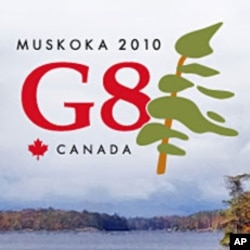In the run-up to next week’s G8 and G20 summits many NGOs and humanitarian organizations are calling on world leaders to boost funding and fulfill past promises. But the troubled global economy may play a role on what leaders decide to do.
One of the many aid organizations that will attend the summits is World Vision, which has programs in 100 countries.
Robert Zachritz, World Vision’s director of advocacy and government relations in Washington, says, “We know the global economy is going to be the major aspect of discussion at both the Group of 8 and Group of 20 meetings. But World Vision is really looking forward to ensure that global poverty is on the agenda, and specifically child and maternal health.”
A little goes a long way
Despite the poor economy, Zachritz says progress on those issues can be made.
“These are investments that really can save lives, that don’t cost that much money and have a high rate of return and need to be considered and keep political momentum moving on them,” he says.
While some new resources may be needed, he says, “In relative to what we’re spending in the global economy it doesn’t look like that much. But yet can have a huge impact in saving the children’s lives.”
Many children, he says, are dying from preventable causes. Several of the Millennium Development Goals concern child and maternal health.
Zachritz expects the economy to be front and center at the G8 and G20 summits, but adds, “Global poverty is equally an important issue.
Pat on the back
“Let’s also give the G8 and G20 credit where credit is due. They have made progress to the “Gleneagles Commitments” back in 2005.” For example, he says, on HIV/AIDS, “The U.S. government kept its promise.”
He says the Obama administration is also on track to keep its promise regarding funding for food security.
“Part of the message is how do you create a system of accountability… when G8/G20 leaders make promises,” he says. Political leaders can change and with them their goals and commitments.
2015
The target date to reach the Millennium Development Goals is 2015. Some groups say whether those goals are achieved may depend on what happens at the Canadian summits.
Zachritz says prospects for some MDGs are better than others.
“One of the things that I think is really special about the Millennium development Goals is they weren’t ‘pie in the sky.’ It was specific goals with specific outcomes, like child and maternal health,” he says.
He estimates the world is two-thirds of the way toward achieving that goal.
“World vision believes that is possible,” he says, “with both the political will and the attention and an increase in resources…. It’s not just about money. It’s aid effectiveness. Of making sure you’re focusing on the right interventions.”
He describes the summits as “critical,” adding, “You get synergy when you have whether it’s 7, 8 or 20 world leaders, the world’s major economies, talking about these issues.”




